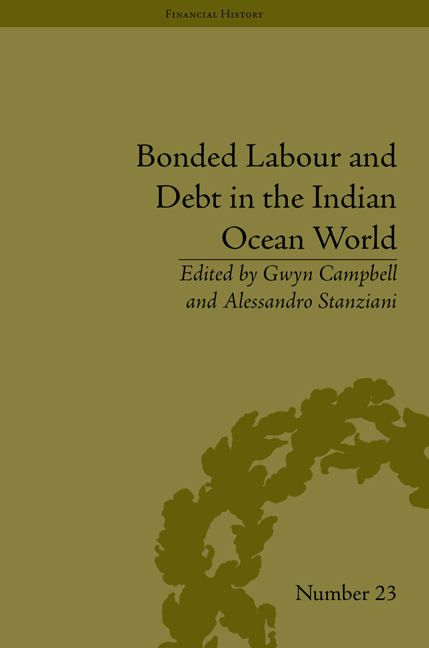Book contents
- Frontmatter
- Contents
- Acknowledgements
- List of Contributors
- Introduction
- 1 Debt and the Coercion of Labour in the Islamic Legal Tradition
- 2 Debt, Pawnship and Slavery in Nineteenth-Century East Africa
- 3 Debt and Slavery in Imperial Madagascar, 1790–1861
- 4 Credit and Debt in the Lives of Freed Slaves at the Cape of Good Hope: The Case of Arnoldus Koevoet, 1697–1735
- 5 Debt, Labour and Bondage: English Servants versus Indentured Immigrants in Mauritius, from the Late Eighteenth to Early Twentieth Century
- 6 Ransom, Escape and Debt Repayment in the Sulu Zone, 1750–1898
- 7 Debt and Slavery among Arabian Gulf Pearl Divers
- 8 The Political Economy of Debt Bondage in Contemporary South India
- 9 The Name of the Slave and the Quality of the Debt: When Slaves Are Not Debtors and Debtors Are Not Slaves in the Family Narrative of a Filipina Comfort Woman
- 10 Two Bonded Labour Emigration Patterns in Mid-Nineteenth-Century Southern China: The Coolie Trade and Emigration to Southeast Asia
- 11 Debt Slaves in Old Korea
- 12 The Debt-Servitude of Prostitutes in Japan during the Edo Period, 1600–1868
- Notes
- Index
9 - The Name of the Slave and the Quality of the Debt: When Slaves Are Not Debtors and Debtors Are Not Slaves in the Family Narrative of a Filipina Comfort Woman
- Frontmatter
- Contents
- Acknowledgements
- List of Contributors
- Introduction
- 1 Debt and the Coercion of Labour in the Islamic Legal Tradition
- 2 Debt, Pawnship and Slavery in Nineteenth-Century East Africa
- 3 Debt and Slavery in Imperial Madagascar, 1790–1861
- 4 Credit and Debt in the Lives of Freed Slaves at the Cape of Good Hope: The Case of Arnoldus Koevoet, 1697–1735
- 5 Debt, Labour and Bondage: English Servants versus Indentured Immigrants in Mauritius, from the Late Eighteenth to Early Twentieth Century
- 6 Ransom, Escape and Debt Repayment in the Sulu Zone, 1750–1898
- 7 Debt and Slavery among Arabian Gulf Pearl Divers
- 8 The Political Economy of Debt Bondage in Contemporary South India
- 9 The Name of the Slave and the Quality of the Debt: When Slaves Are Not Debtors and Debtors Are Not Slaves in the Family Narrative of a Filipina Comfort Woman
- 10 Two Bonded Labour Emigration Patterns in Mid-Nineteenth-Century Southern China: The Coolie Trade and Emigration to Southeast Asia
- 11 Debt Slaves in Old Korea
- 12 The Debt-Servitude of Prostitutes in Japan during the Edo Period, 1600–1868
- Notes
- Index
Summary
Indebtedness and slaving are protean practices that straddle boundaries, respectively, within and between communities. Fathoming the relationship between debt and slavery in a wide comparative perspective requires a consideration of both historical specificity and the extent to which cultures are porous, malleable and may reciprocally inform each other as well as misinterpret each other, both historically and coevally.
As M. I. Finley and Gyan Prakash have expounded, debt has entailed servitude or bondage only under particular historical and cultural conditions. In writing about ancient Greece, Finley noted that ‘it was only between classes, between rich and poor, to put it in loose and simple terms, that debt led to bondage’, and that bondage was a condition of the loan rather than a punishment for default. Revisiting Finley's thesis, Prakash underscored that ‘[i]t was not the power of money that bonded people but the fact that persons advancing and receiving money were of unequal ranks’, and then elaborated that ‘debt bondage's claim to universality is untenable’. Rather than being ‘ontological facts’, Prakash explained that the theory of a natural state of freedom cancelled by monetary debt contains key constituents of the hegemony of Enlightenment political philosophy and bourgeois capitalism, both of which are historically specific and culturally rooted in Europe (or, as some put it, the West).
- Type
- Chapter
- Information
- Bonded Labour and Debt in the Indian Ocean World , pp. 135 - 152Publisher: Pickering & ChattoFirst published in: 2014



